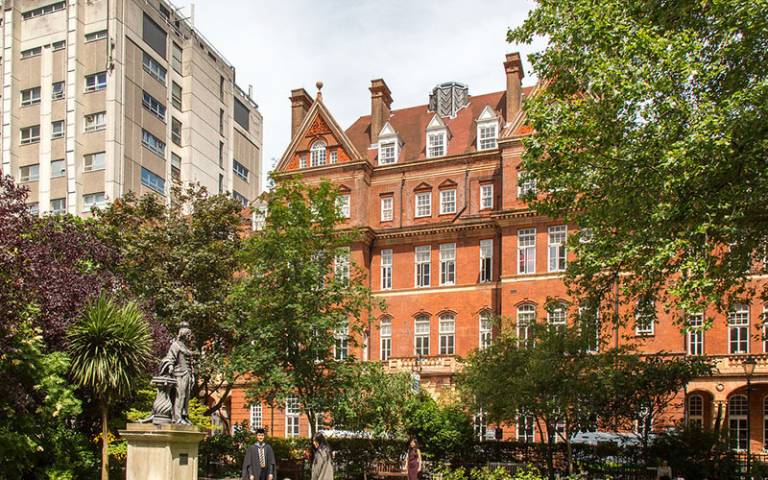A cross-Atlantic collaboration helps stroke recovery
Global Engagement Funds facilitated a collaboration between UCL and John Hopkins University, USA, to bring together two areas of stroke rehabilitation research

23 September 2021
Professor Sven Bestmann at the UCL Institute of Neurology used Global Engagement Funds (GEF) to set up face-to-face visits with Professor John Krakauer and Dr Adrian Haith from John Hopkins University in the United States, enabling them to start a collaboration which could have a significant impact on patients recovering from strokes.
Since starting their collaboration, the group has been awarded over £650,000 in funding leading to a string of speaking opportunities, papers and student involvement.
Two world-leading research groups with different perspectives
Stroke is one of the most common forms of physical disability in the world with a huge socioeconomic impact. One of the most devastating impairments is the loss of upper limbs (arms, hands).
Remarkably, we often do not know which aspects of motor control change during rehabilitation, even though we can measure clinically that some patients do get a lot better.
The research groups at each university focus on different aspects of stroke rehabilitation and through this collaboration aim to:
- Compare recovery in their specialist groups (UCL – chronic patients and John Hopkins – acute patients)
- Identify the specific processes of recovery
- Standardise the upper limb stroke rehabilitation research programmes at UCL and John Hopkins University to allow for comparison.
With both groups having complementary expertise and access to patients, facilities and equipment (such as the KinArm Exosceleton, recently acquired by Prof Nick Ward with support from UCLH Charties: the only one of its kind in the UK), they are able to benefit each other’s research immensely through this collaborative partnership.
UCL: chronic stroke treatment and research
At UCL, we focus on chronic stroke patients (i.e. around six or more months after the stroke occurred).
The Upper Limb Neurorehabilitation Programme led by Professor Nick Ward is central to this, and is currently the only service of its kind in the UK.
The rehabilitation programme at UCL is unique in that it is directly embedded into the local research of the research groups, and sees over 120 patients every year. This provides unique opportunities to study patients before, during and after upper limb rehabilitation, which our collaborators are unable to do.
We have expertise in non-invasive brain stimulation which benefit our collaborators, who have a research interest in advancing stimulation approaches in treating patients.
John Hopkins: caring for those in acute stroke rehabilitation
The team at John Hopkins have a similar research programme to UCL, but they focus on acute stroke patients (i.e. days to weeks after the stroke).
The groups at Hopkins are world-leading in motor control and stroke rehabilitation.
A collaboration which keeps growing
The GEF funding helped Professor Bestman visit John Hopkins University and for Professor Krakauer and Dr Haith to visit UCL.
These face-to-face meetings were essential to building this collaboration. The academics will soon analyse the first results from their current cohort of over 50 patients.
Two UCL MSc students and a PhD student have also benefitted from working on the project.
Professor Krakauer will be speaking on the UCL Upper Limb course and they are discussing further papers, grants and building stronger links with our local research and clinical teams working on aphasia (where speech is affected by a stroke), to link up with the similar rehabilitation programme recently set up at UCL by Professors Leff and Crinion.
Professor Bestmann commented, “The Global Engagement Funds has, in essence, provided support for several visits, which have been absolutely critical and important in facilitating discussions and initiating much of the work we’re currently doing.”
More information
- Professor Sven Bestmann academic profile
- Professor John W. Krakauer profile
- Professor Nick Ward profile
- The Bestmann Lab
- UCL Queen Square Institute of Neurology
- John Hopkins University
For the latest news about UCL’s international activity, partnerships and opportunities, subscribe to the bimonthly Global Update newsletter.
 Close
Close

